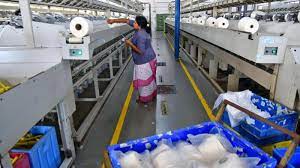Panipat’s yarn industry faces pollution crisis amid textile recycling boom
Panipat, India’s largest textile recycling hub, processes about 250 tons of secondhand clothing daily, refurbishing and repurposing fabric into yarn and new textiles. This recycling sustains the local economy and employs thousands, but it has also led to severe environmental damage.
Toxic waste from textile dyeing and washing processes is released untreated into the ground and water sources. This pollution has caused significant air and water contamination, with Panipat recording dangerous levels of air pollutants and high levels of toxic chemicals in groundwater. Residents face growing health issues, including respiratory diseases and skin allergies.
While companies like Aadi Sustainability Solutions advocate cleaner practices, such as using 100 per cent cotton and improving recycling technologies, most recycling units in Panipat rely on outdated methods. Additionally, the widespread use of diesel-powered generators worsens pollution.

Local leaders and sustainability advocates urge the government to implement stricter regulations and promote clean energy alternatives. Without intervention, Panipat’s dual role as a recycling powerhouse and pollution hotspot threatens both public health and the environment.
